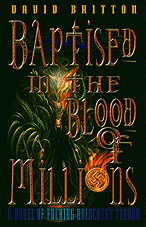| HOME | BOOKS | COMICS | RECORDS | NEWS | PEOPLE | PICTURES | ORDERS | HISTORY | office@savoy.abel.co.uk |
|
|
Baptised In The Blood Of Millions
David Britton 2001 b/w illustrated 240mm x 158mm Hard covers First publication 254pp ISBN 0 86130 101 3 |
|
|
|
|
|
Don't let the perversely generic jacket of this book deceive you.
Art prompts questions. Only bad art gives answers. David Britton's novel, Lord Horror, published in 1990, became the first book to be banned in England
since Hubert Selby Jnr's Last Exit to Brooklyn in 1968. Geoffrey Robertson QC and Article 19 led the appeal in 1992, when the ban was overturned.
Baptised in the Blood of Millions is the second Lord Horror novel. Allegedly an 'autobiographical' work, the book is set in a very bizarre alternate universe in England before and after the Second World War. Events are rendered in Symbolist fashion and explore the British Fascism of Oswald Mosley's Blackshirts and war-time radio broadcaster Lord Haw-Haw. Other dramatis personae include pop icon Jack Good, 1950s parliamentarian Lord Boothby, philosopher Ludwig Wittgenstein, poetess Sylvia Plath and the biggest English movie star of the 1930s, Jessie Matthews. Includes illustrations by the author. We guarantee you will never read another novel like this one! Cover art by John Coulthart. Notes and pictures below shed some light on a number of the real personalities in the narrative. • See the Orders page for purchase details. |
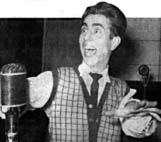 |
Gus Goodwin, the first, the best, the wildest English Rock'n'Roll DJ. Host of 'Rockabilly Party' on Radio Luxembourg in the 1950s, Gus appears as himself in Chapter Two discoursing with Lord Horror upon the state and origins of Rock'n'Roll. Accompanying Horror on his sojourn through Chelsea in velvet collar, turned-back cuffs, luminous socks and immaculately wild DA, this champion of true rock makes his first public appearance for fifty years in Baptised in the Blood of Millions. |
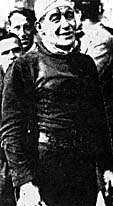 |
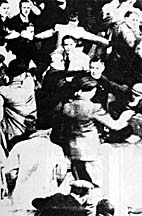 Tommy Moran drops in and out of the novel. Firm confidant and friend to our man Horror, and hero of the Battle of Cable Street (left). Resurrected from history, he again proved his worth, walking the boards of Auschwitz through Soho with Mr Horror and Sir Oswald Mosley. A patriotic British Fascist, a fighter and a courageous son of Hull. Tommy Moran drops in and out of the novel. Firm confidant and friend to our man Horror, and hero of the Battle of Cable Street (left). Resurrected from history, he again proved his worth, walking the boards of Auschwitz through Soho with Mr Horror and Sir Oswald Mosley. A patriotic British Fascist, a fighter and a courageous son of Hull. |
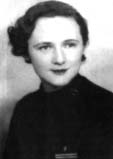 |
Margaret Cains White, beautiful wife of Lord Haw-Haw (William Joyce), flirts with
his doppelgänger, Lord Horror, in Chapter One. Never lost faith
in the stance and judgement of her husband both in his broadcasts
from the Fatherland and his subsequent imprisonment in England,
where he was hung as a traitor at Wandsworth Prison in 1946. (Another
example of British rough justice being dealt out arbitrarily to
the wrong man).
Mrs Margaret Joyce, a truly brave woman. |
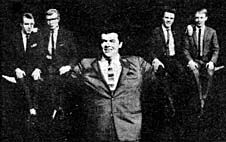 |
Kingsize Taylor, a major influence on The Beatles, particularly John Lennon. With his band, The Dominoes, was the first Merseybeat Rock'n'Roller. His was the standard—in Horror's opinion—by which all other English rock groups are to be judged, and found wanting. Possessed of a truly incredible voice, with a vocal excitement and range to equal Captain Beefheart's or Little Richard's. He retired from the business in the middle 1960s. His correct position in rock history is dealt with in Chapter Two. This photograph, published in 1963, was the inspiration for the ultra-warped character Big, who appears in Chapter Four. A singer whose achievements are ignored in virtually all discussions of music history. |
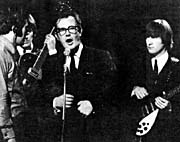 |
Jack Good (pictured here presenting The Beatles on his Beatles TV special).
Seminal English Rock'n'Roll TV producer and the first articulate
writer on the subject of rock. To be mentioned in the same breath
as Sam Phillips and Alan Freed; the only television producer to capture the visual excitement
of the music itself. Good set the standard both in England with
'Oh Boy' and in America with 'Shindig'. All subsequent TV music programmes, from 'Ready Steady Go'
to 'The Tube' and MTV owe a huge debt to his productions, and
have invariably been inferior.
Appears in Chapter Two as himself, courting controversy with his statement to Lord Horror that Larry Williams is the most dangerous Rock'n'Roll singer in the world. Correct. |
 |
Sylvia Plath. Beds Horror in Chapter Three. The implication (in Motherfuckers) that T S Eliot plagiarised Lord Horror's homilies and poetic turns of phrase for The Hollow Men and The Waste Land, comes as no surprise to her. She recognises Horror as the man with the Mein Kampf Look and observes other idiosyncrasies of his personality which later appear in her beautiful poetry. |
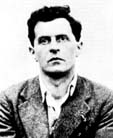 |
Ludwig Wittgenstein. First referred to in Lord Horror. Philosopher, old Manchester homosexual, jet engine buff, admirer of Carmen Miranda, and author of the Tractatus Logico-Philosophicus, that elegant razor of philosophic principle. Comes as an avenging Auschwitz angel to Horror and Jessie in Chapter Three. His arrival foreshadows events in Chapter Four, set in Soho, where William Blake received his angel visitations. |
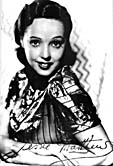 |
Jessie Matthews. Lord Horror's wife. Famous English dancer, singer and movie actress of the 1930s, in fact, the biggest female star England has produced. Mrs Matthews supplies the counterpoint to Horror's hardline personality. Erotic, neurotic, charming, sweet—and underneath it all has a humane view of life. At once innocent yet worldly she teases out the feminine in our monster. A consistent presence in the Lord Horror comics, records and books. |
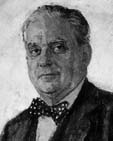 |
Lord Boothby. Parliamentarian, one of the most famous television personalities of his day, cuckolder of Harold Macmillan, a renowned front-and-back merchant. Dismantled in an 'amorata's passion' by Horror in Chapter Two. An English lord whose appearance and speech always makes the flesh creep. |
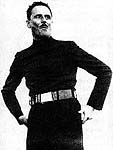 |
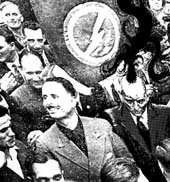 Sir Oswald Mosley, the leading British Fascist. Horror's original benefactor and
mentor, the only man he rates on the political scene. Never his
equal, of course, but for all that a man not to be underestimated.
Still badly maligned by the English establishment and the media
in general. Given the chance, would have fought for Albion; his
dignity under duress is noted. Sir Oswald Mosley, the leading British Fascist. Horror's original benefactor and
mentor, the only man he rates on the political scene. Never his
equal, of course, but for all that a man not to be underestimated.
Still badly maligned by the English establishment and the media
in general. Given the chance, would have fought for Albion; his
dignity under duress is noted. |
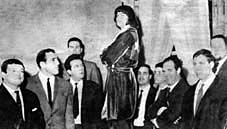 |
PJ Proby. Not mentioned by name, but his creeping presence permeates the novel—always our main man (see the Proby Mojo interview, May 1997). |
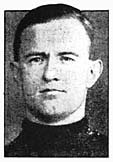 |
William Joyce (Lord Haw-Haw). The light around which everything whirls, the real snake beneath Lord Horror's skin. One of the most impressive and impassioned public speakers of the 20th Century, his broadcasts from Germany to England were in the vanguard of excitement and dementia which kicked off original Rock'n'Roll. An adamant anti-Semite passion fuelled his dark persona, matched by a strict code of honour which clashed with authorities on both sides of the war. To the end, his own man—never Wobbled or danced the Dicky-Doo. |
|
|
"Dave Britton's Motherfuckers appeared in 1996 and Baptised in the Blood of Millions completes his Lord Horror trilogy. Definitely not the fascistic or racist tract some people have mistaken it for, it remains a compelling and terrifying echo of the Nazi mind-set—far closer to understanding the leaders of pre-war Germany and their crimes than the biographies I've been reading."
MICHAEL MOORCOCK
"Is literature dangerous? 'Big glow-worms, red as cinders, made entrance from his stretched bowels, walking right out, onion-stenched, the colour of niggers dropped smooth on their heads. How could I see this in the flame? I do not know, but answer carefully that all that can be viewed is never the full canvas; and stood foursquare before that blaze-topped being resembling (as I have stated) Azazel, the goat shamen, that reviled pig of the Jew.' Hanged boys, their cocks spurting as their necks snap, can be found in branches of Waterstone's up and down the country: check the fiction section, under B for Burroughs. The excesses of fashionable shock merchants like Brett Easton Ellis and Dennis Cooper nestle alongside bloated Jilly Cooper novels; even works explicitly detailing the fine points of the greatest bugbear of the day, child sexuality and abuse, have found a home here. A distinction is made, a line drawn. This is literature. Where one burns books, one finally burns people. And Savoy? '"I want a better England. Who could not want a better England? Not just a return to Empire and Expansion, but real pride expressed in old Albion, in our National achievements, which is superior to all countries excepting Germany. We rode unseeingly into the valley of cursed blood, and to our detriment we allowed foreign BLOOD to pollute our sacred heritage. England has become a mongrel circus. The rejects, the spastics, the bent, the mental cripples of the world have gleefully mounted our Motherland, in the process fucking her down to her knees, without clemency. Hand-outs to every sub-continent of ethnic wasters on earth have weakened our divinity. "What is England now but the laughing stock of the Earth? So unsure of our worth that under the guise of liberal moralising, we throw away our greatest asset—the pureness of English blood."' It is perhaps unfair to start any review of a Savoy product referring to censorship. Savoy has been around for such a long time, and has published such a wide variety of books, that to be considered solely as the victims of a tyrannical state's efforts to silence the subversive must be galling for them. And yet it is keenly pertinent here. The first Lord Horror novel, Lord Horror, published in 1990, was the first book to be banned in England since Hubert Selby Jr's Last Exit to Brooklyn in 1968; the ban was overturned on appeal in 1992. The Lord Horror comics have similarly come under fire, with some still banned to this day. Lord Horror's strong stuff—make no mistake. So what's so contentious? Books dealing with the Holocaust, anti-Semitism and fascism are hardly new. The Holocaust has indeed attained iconic status as the ultimate display of man's inhumanity to man—a nightmarish other-world of pure evil, the kind of thing that could never happen in England. The industry surrounding the revisiting of the Holocaust today, from high-budget Hollywood recreations to tourist trips to Auschwitz, an inverse Disneyland, strengthens the iconography by ensuring that the Holocaust and Nazi Germany occupy bogeymen position in our minds—a kind of fairytale grimness hangs over these revisited scenes. But allowing the imagination free rein to play with the established iconography is strongly taboo; any divergence is often punished by law, demonstrating not only a panicked reaction to the spectre of neo-Nazism but also a keen desire to keep the boundaries clearly marked. We are good. They are bad. We could not do this. We are not responsible. It's a similar dichotomy to that found in the phenomenon of 'true crime', and the press coverage of paedophiles and child killers: a demonising which serves to distance 'us' from 'them', a reassurance that this is what 'pure evil' is like. Inhuman, bestial—these people couldn't possibly be like us. Such passionate hatred is only seen elsewhere on these shores in the reaction of some parts of the British population to immigration—newsgroup postings with titles like 'send them back or string them up' are not uncommon. Immigrants—a distinction is occasionally but not often made between illegal immigrants and asylum seekers—are filthy, lazy and greedy; not a million miles from the projected face of Jews in Nazi Germany. But of course that could never happen here - although there were English sympathisers to the Nazi cause. It blurs the boundaries a little, so they're not discussed much nowadays. One was William Joyce, who broadcast Nazi propaganda from Germany to Britain. Also known as Lord Haw-Haw—whose doppelgänger here is Lord Horror. The world of Lord Horror is one which takes the constituent elements of the Holocaust and the culture surrounding it—along with liberal dashes of absurdist humour, modernist literature and full-bore rock'n'roll—and forces them together in ways which simultaneously don't fit and perversely shed more light on the psychology of fascism than any number of more straight-laced tomes. The world of Lord Horror is one of irreducible weirdness. There's no discernible plot development, either here or in the Lord Horror comics; just a cycle of horrific atrocities peppered with grotesque comedy. Burning Jews rain from the sky, confectionery spilling from every orifice; new extremes of slaughter are matched blow for blow with new extremes of absurdity. It's not only the content which jars, either; the style is a similarly bizarre mix of register, arcane dialogue mixing with wartime slang and a continual use of asides—Horror's thoughts on life, the universe, buggery and the judicious use of a straight razor. It's important to see Baptised in the Blood of Millions as the latest instalment of an ongoing project, dovetailing neatly into the space left by the first Lord Horror novel and the Lord Horror comics, which have been published at an astonishingly slow rate—about one a year at present - since 1989. The text in the Lord Horror comics is more impenetrable than that on offer here, some issues being made entirely of cut-ups from works like The Waste Land and Ulysses; but the fact that the series features some of artist John Coulthart's most impressive illustrations, making it an essential read, as well as being probably the only British comic around worth reading. Baptised in the Blood of Millions presents the Horror universe in a different light altogether; while the comics present a sense of fracture and discontinuity, all fragmented quotations and looping atrocities, this is presented in the style of an autobiography, with Horror concomitantly awarding himself the airs and graces of a turn-of-the-century dandy, proud as a peacock. The style and content here are moreover absurdist rather than modernist, and Horror's egotism reveals his fallibility and weakness—a far cry from the superheroic character of the comics. As tasters for the Lord Horror universe either will do—you'll want to investigate more, even if neither the comics nor the book can truly be said to entertain. Britton's vision is too dark, his take both too bizarre and too perfectly fitting for this to be an easy read—but you can be sure, at a time when popular fiction has all the verve of a limbless whippet, that it'll be like nothing you've ever seen before." JAMES MARRIOTT, Black Star Review "If you like your books challenging, they don't come much more challenging than this. Baptised in the Blood of Millions is Britton's third novel in the Lord Horror series. The first (of the same name) has yet to see print in English and is the only book in Britain to have been banned since Last Exit to Brooklyn. The second, entitled Motherfuckers, covers much of the same ground, but with a comic flair sadly missing from Baptised. This book is perhaps his most relentless work to date. The novel's protagonist, a fictionalised, mythologized simulacrum of the wartime radio traitor William Joyce, aka. Lord Haw-haw, battles his way through a London besieged by Germania and terrorised by chocolate-covered Jews fired as missiles against the hapless citizenry. This book sets an unholy pace, as happy tackling the relative merits of rock'n'roll, as Wittgenstein and Schopenhauer, hardcore sex, international Jewry, political didactics, and wartime confectionery; it slices through history like a cutthroat razor. It's impossible to compare Britton's work with any other contemporary British writer because it is nothing like anything written by any other contemporary British writer. Only by taking a leaf out of Britton's insanely eclectic world can you get anywhere near the essence of it. Imagine Screwdriver, The Specials, P.J. Proby, the Prodigy and AC/DC providing the soundtrack, then add a dollop of Swift, Burroughs, Home, Lovecraft, Ballard and Moorcock, and you're kind of getting there. Then all you need is some bizarre, redundant cultural iconography and weird wartime slang. Swallow your Prozac, exterminate all rational thought and leave your prejudices at the door. Then you might 'enjoy' “Baptised for what it is”. That said, the book does suffer from blindingly obtuse linguistic tomfoolery, repetition, a sense of surrealism that would shame Bosch, no sense of narrative cohesion, and a complete lack of concern for the sanity of its reader. I wouldn't read it twice. But I'd read it once." AMAZON review The Monkey (or, in this case, SFX) Speaks its Mind... There are three ways to become a famous writer. 1: Churn out pot-boilers tailored to the mass market. 2: Produce a work of genius. 3: Court controversy and hope you are demonised by The Daily Mail. David Britton chose the third path. If you've heard of the book's protagonist, Lord Horror, it's probably because of the furore surrounding the first Lord Horror book, and the Lord Horror comics. This is Britton's third Lord Horror novel, a semen and blood-spattered fever-dream set in an alternate universe England, where Horror hobnobs with Oswald Mosley, slaughters Jews, and has pornographic liaisons with (amongst others) Sylvia Plath and Ludwig Wittgenstein. The latter pops up as a monstrous tentacled angel whose many orifices Horror enthusiastically penetrates. Now, your reviewer is all in favour of a bit of epatér les bourgeois and this could be a diverting read... if it weren't for the prose style, which is egregious beyond description. The author has a childish delight in using archaic vocabulary, and can't resist showing off his colossal erudition. Hence repeated self-aggrandising digressions in which he parades his knowledge. You can't get through a page without having to stifle giggles at the pompous redundancy of the literary quotations. No doubt many liberals would like to see Britton's books gathered up and burnt, not recognising the perverse irony in aping fascist actions. Others defend the books as Swiftian satire. Both camps are missing the point. The truly offensive things about this book are its monstrous hubris and its narcotic tediousness. Britton probably considers himself a libertarian storm trooper, fearlessly transgressing taboos that a politically-correct herd unthinkingly adhere to. But to anyone remotely worldly-wise, this book is as shocking as the malodorous contents of a toddler's potty. IAN BERRIMAN, SFX |
| Main Book Page | Author Index | Book Covers Index | Title Index | Articles | The Revenant Zone | Links |
